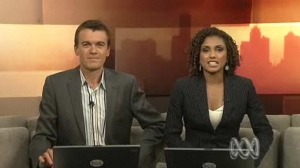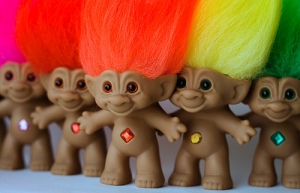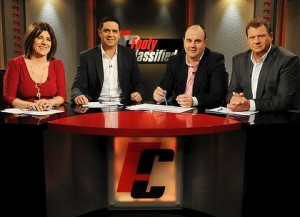I’ve been lax on my blogfoolery of late. Every time I felt like I had a spare moment to pen something, I found myself consumed by ennui, uninspired by most of what I saw, and that which I did would more easily be expressed in 140 characters than anything more considered.
 But I have been roused. This morning, an ordinary, if stinking hot, Melbourne Thursday, I was watching News Breakfast on ABC24 as I prepared for work. They decided to cut to the pre-parliament doorstops to pad for time. First up, we were halfway through Tony Windsor, who, as always, had smart things to say about the Murray-Darling Basin Plan. The journalists were curious about some letter the PM had written. Windsor had nothing to say on that, instead asking if anyone had questions about the Plan. None did, so he left. Next up, waiting in the wings (quite literally) was Chris Pyne.
But I have been roused. This morning, an ordinary, if stinking hot, Melbourne Thursday, I was watching News Breakfast on ABC24 as I prepared for work. They decided to cut to the pre-parliament doorstops to pad for time. First up, we were halfway through Tony Windsor, who, as always, had smart things to say about the Murray-Darling Basin Plan. The journalists were curious about some letter the PM had written. Windsor had nothing to say on that, instead asking if anyone had questions about the Plan. None did, so he left. Next up, waiting in the wings (quite literally) was Chris Pyne.
He had plenty to say.
I’m not going to get into the stuff he tossed around because, frankly, I haven’t paid much mind to it all, but if you want the details, Ben Eltham over at New Matilda has a good summary of all this Gillard rubbish.
Pyne finished his tear, then Adam Bandt stepped up to discuss the various reforms going up before parliament today. News Breakfast cut back to the “anchors” who then repeated Pyne’s claims.
This is why I’m riled up this morning.
Ordinarily I’m loathe to apportion blame when it comes to the carousel of bullshit that is national political discourse. Politicians have a social obligation to look after the national interest. The media have a social obligation to report honestly, and on issues that balance between the public interest and what the public is interested in. The public have an obligation, as good citizens, to pay attention to important issues of the day. The turd load is evenly distributed.
But in this case, it’s the media’s fault.
This is a non-story. Not even meritorious of ‘scandal’, ‘gate’ or even a consistent hashtag. A piece of ridiculous confection that the opposition have every reason to go to town on, given that they have an election to win, and creating the impression, however tenuous, of a corrupt government is great for them, and takes attention away from their “policies”.
The government are desperately alternating between trying to deny the issue oxygen, then having a crack at a controlled burn, in the hope that there will be no further flare-ups.
The public, meanwhile simply doesn’t care. It switched off long ago. The whole Slater & Gordon brouhaha was boring to begin with, unrelated to any issues of importance. Now, it so fiendishly convoluted that only the most tragic or partisan have any understanding of what is happening. I certainly can’t follow it anymore.
But the media simply won’t let it go. There are a million reasons for this, but I think there are two that are paramount:
- It’s way easier to report on. Policy is hard. It means that journalists, researchers and interviewers need to read detailed briefers, consult experts and generally get their heads around complicated issues that have real-world effects. Bollocks to that. Repeating “claims” and “allegations” is far more fun, and simply requires turning up at a Canberra doorstop before repeating the claim that the PM has ‘questions to answer’, without actually deciding what those questions are, and having had two discrete opportunities to put any and all questions to her. But that’s the minor reason. The big one?
- General Sherman. You may recall in the Simpsons the enormous, possibly mythical catfish that Homer sets off after in lieu of attending marriage counselling. That’s this story. Bringing down a sitting PM is the ultimate in journalistic achievement. For all the talk among partisans about bias in the media (which, of course there is, but it’s down to the individual journalist much of the time, and is usually suppressed by larger organisational biases), every journalist’s prejudice is trumped by getting a “yarn”. No matter how dyed-in-the-wool Labor, any journo would jump at the chance to be the one to break The Story of the Decade and unseat Gillard.
Rather than sit in a boat, fishing for a smoking gun that it is increasingly apparent doesn’t exist, our journalistic class would be better advised to do their jobs, sit down with Marge and explain the ins and outs of the numerous issues that should be on the front page. NDIS, Murray-Darling Plan, melting permafrost, the Kyoto negotiations in Doha, hunger strikes on Nauru, you name it.
In the end, the overall sensation for me in this sea of vacuity is one of sadness. Imagine, if you would, a world where this level of forensic research and doggedness was applied to issues of actual importance. Perhaps the public may have known how a carbon price actually works. Perhaps the public would understand the difference between the paid parental leave schemes of both major parties. Perhaps someone could explain to me how the NDIS works. Perhaps, perhaps, perhaps…
So fuck you, media. I no longer want to see Christopher Pyne suggest there are questions to answer.












